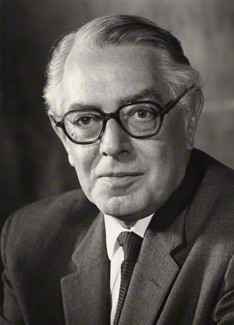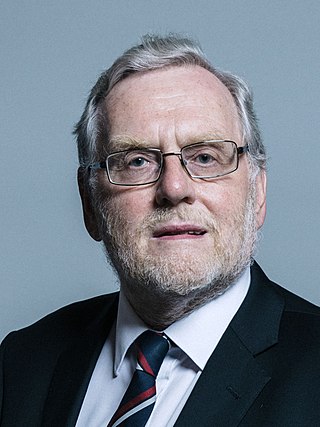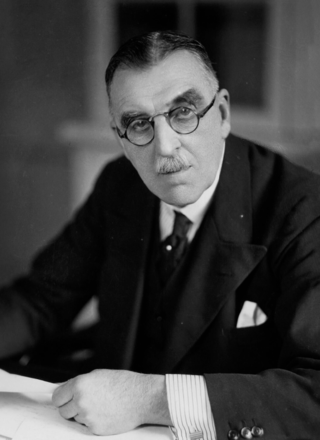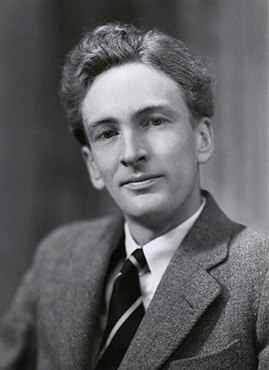
The secretary of state for foreign, Commonwealth and development affairs, also known as the foreign secretary, is a secretary of state in the Government of the United Kingdom, with responsibility for the Foreign, Commonwealth and Development Office. The role is seen as one of the most senior ministers in the UK Government and is a Great Office of State. The incumbent is a member of the Cabinet of the United Kingdom and National Security Council, and reports directly to the prime minister.
A by-election, also known as a special election in the United States and the Philippines, and a bye-election or a bypoll in India, is an election used to fill an office that has become vacant between general elections.

Edward Arthur Alexander Shackleton, Baron Shackleton, was a British geographer, Royal Air Force officer and Labour Party politician.

Alan Gordon Barraclough Haselhurst, Baron Haselhurst,, is a British Conservative Party politician who served as Member of Parliament (MP) for Saffron Walden from 1977 to 2017, having previously represented Middleton and Prestwich from 1970 to February 1974. Haselhurst was Chairman of Ways and Means from 14 May 1997 to 8 June 2010, and later Chairman of the Commonwealth Parliamentary Association between 2011 and 2014. The oldest Conservative MP to stand down at the 2017 general election, he was created a life peer on 22 June 2018, sitting in the House of Lords as Baron Haselhurst.

John Francis Spellar, Baron Spellar,, is a British politician who served as Member of Parliament (MP) for Warley, formerly Warley West, from 1992 to 2024. A member of the Labour Party, he previously represented Birmingham Northfield from 1982 to 1983. He served as a minister in various departments between 1997 and 2005, and as Comptroller of the Household in the Whips' Office between 2008 and 2010. After Labour entered opposition, he served as a shadow Foreign Office minister from 2010 to 2015.

Andrew Matthew William Faulds was a British actor and Labour Party politician. After a successful acting career on stage, on radio and in films, he was a Member of Parliament from 1966 to 1997.
Peter Harry Steve Griffiths was a British Conservative politician best known for gaining the Smethwick seat by defeating the Shadow Foreign Secretary Patrick Gordon Walker in the 1964 general election, against the national trend, by using anti-immigrant and racist rhetoric.

Robert Michael Maitland Stewart, Baron Stewart of Fulham, was a British Labour Party politician, life peer and Fabian Socialist who was a Member of Parliament for 34 years, and served twice as Foreign Secretary in the first cabinet of Harold Wilson.

Sir Arthur Sackville Trevor Griffith-Boscawen PC was a British politician in the Conservative Party whose career was cut short by losing a string of Parliamentary elections.

Peter Wynford Innes Rees, Baron Rees, was a British Conservative politician and barrister. He was Member of Parliament (MP) for Dover and Deal from 1974 to 1983 and MP for Dover from 1970 to 1974 and 1983 to 1987. He was Chief Secretary to the Treasury from 1983 until 1985. He was created a life peer as Baron Rees, of Goytre, in 1987.
Alfred James Dobbs was a British Labour Party politician and trade unionist. He died in a car accident the day after he had been elected as a Member of Parliament (MP) for Smethwick. His one day as an MP remains the shortest term in the era after the Second World War.

Smethwick is a parliamentary constituency, centred on the town of Smethwick in Staffordshire. It returns one Member of Parliament (MP) to the House of Commons of the Parliament of the United Kingdom, elected by the first past the post voting system. The constituency was created for the 1918 general election, abolished for the February 1974 general election, and re-established for the 2024 general election. It is formed from the abolished Warley constituency, with the addition of most of the Blackheath ward.

Sydney Arnold, 1st Baron Arnold was a radical British Liberal Party politician who later joined the Labour Party and served as a government minister.
Reginald William Sorensen, Baron Sorensen was a Unitarian minister and Labour Party politician in the United Kingdom. He was a Member of Parliament (MP) for over thirty years between 1929 and 1964.
The 1965 Leyton by-election was a parliamentary by-election held on 21 January 1965 for the House of Commons constituency of Leyton in east London.

Ronald Carlile Buxton was a Chartered Structural Engineer, successful businessman, and Conservative Party politician in the United Kingdom.
The 1945 Smethwick by-election was a by-election held on 1 October 1945 for the British House of Commons constituency of Smethwick in Staffordshire.

The 1997 Prime Minister's Resignation Honours were officially announced in two supplements to The London Gazette of 1 August 1997 and marked the May 1997 resignation of the Prime Minister, John Major.

Herbert Stanley Morrison, Baron Morrison of Lambeth, was a British politician who held a variety of senior positions in the Cabinet as a member of the Labour Party. During the inter-war period, he was Minister of Transport during the Second MacDonald ministry, then after losing his parliamentary seat in the 1931 general election, he became Leader of the London County Council in the 1930s. After returning to the Commons, he was defeated by Clement Attlee in the 1935 Labour Party leadership election but later acted as Home Secretary in the wartime coalition.

The constituency of Smethwick in the West Midlands of England gained national media coverage at the 1964 general election, when Peter Griffiths of the Conservative Party gained the seat against the national trend, amidst controversy concerning racism.
















